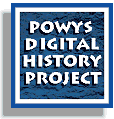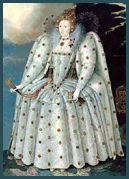
The Reformation in Wales 4
The Elizabethan church
Supreme Governor of the church
On her accession in 1558 Queen Elizabeth 1 (below)
was most concerned to make her own position  more
secure. She maintained the crown’s position as head of the
church but was keen to promote a church which would attract a
wide support. She took the title Supreme Governor of the
church rather than Supreme Head, and her Act of Uniformity
imposed a Prayer Book which was not as radical as some would
have preferred. Use of the new prayer book throughout Wales seems
only to have caused disquiet by its use of the English language.
more
secure. She maintained the crown’s position as head of the
church but was keen to promote a church which would attract a
wide support. She took the title Supreme Governor of the
church rather than Supreme Head, and her Act of Uniformity
imposed a Prayer Book which was not as radical as some would
have preferred. Use of the new prayer book throughout Wales seems
only to have caused disquiet by its use of the English language.
An Act of 1563 required the provision of a Welsh language Bible
and Prayer Book within three years by the three Welsh dioceses
and the diocese of Hereford.
A new Welsh bible
The Litany and the Book of Common Prayer were published in Welsh
within a few years but the Welsh Bible was not published in full
until 1588. This was produced by William
Morgan, vicar of Welshpool and later of Llanrhaeadr-ym-Mochnant
during the years of his great work. The demands of this huge
undertaking lead to claims of neglect in his parish and Morgan
was resident in Westminster for a while to oversee the printing
of the Welsh bible in London. Morgan had the backing of Archbishop
Whitgift, and went on to become Bishop of Llandaff and later
of St Asaph. His Welsh bible was introduced in churches across
Wales with the full support of the Privy Council, and its widespread
use was of great significance to Welsh culture as well as religion.
Even catholic Welsh bards like Sion Dafydd Rhys sang its praises.
Perhaps most significantly it bore the message of the Reformation
to the monoglot population of the principality.
Enemies of the state
The traditions of Catholicism took a long time to replace among
a conservative population who would go along with the reforms
on the surface but still clung to their old practices. Eradication
of these vestiges became more urgent during the reign of Elizabeth
when Rome supported opponents of her reign, and to be a papist
meant being an enemy of the state.
In the 1590s there was an active campaign against Catholics in
Wales, with the seeking out of priests and the banning of visits
to shrines. John Games of Breconshire was charged in the Star
Chamber with reading catholic literature. The new Welsh language
bible and prayer book became accepted as the norm though, and
by the time of the religious upheavals of the Commonwealth years
the Elizabethan religious practices had become as much a part
of Welsh religious tradition as the earlier catholic observances
had been.
The are 4 pages on the Reformation in Wales. Use the box links below to view the other pages.